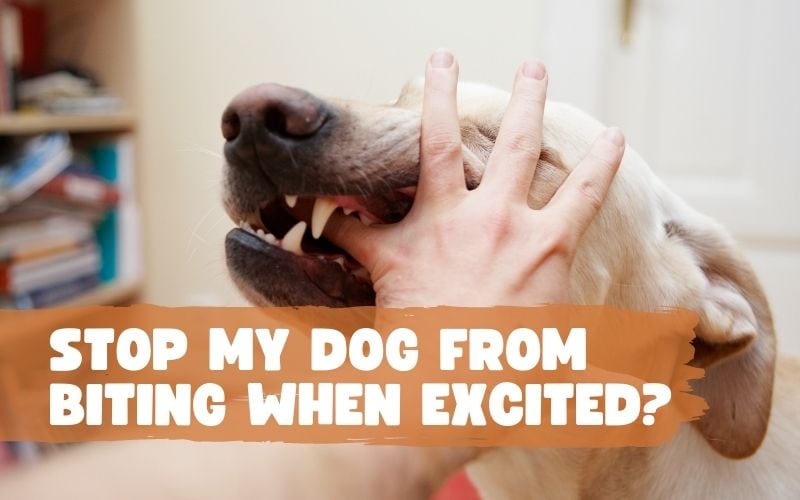Most pet parents dislike dogs who bite, chew, or mouth their hands, feet, or clothing when playing or interacting with them.
Adult dog jaws are much stronger and cause more pain than puppy teeth. Moreover, the dogs themselves can accidentally injure themselves while mouthing. Adult dogs are more difficult to handle physically than pups because they are larger, difficult to control, and less responsive to our reactions.
Reasons why dogs nip at you
Dogs use their mouth to get to know the world around them. Nipping or biting is a common behavior when the dogs are excited. Here are some simple reasons why a dog bites.
- Your dog wants to play by chewing something and your hand or foot is the nearest thing he can see.
- He finds your hand/foot moving very fast and he likes to chase and bite.
- He likes the way you squeal and/or move fast when he nips.
- He has jaw-wrestled with other dogs and wants to do it with you.
- Chewing and mouthing something makes him calmer.
Here are a few suggestions you can try to stop dog nipping when excited.
Ways to stop a dog from biting when excited
1. Distract the dog
Distractions are quite useful if your dog becomes aggressive or excited. This strategy is highly effective to stop a puppy from biting when excited. When a dog looks as if it is getting overenthusiastic, start clapping or pointing fingers to distract it. You can also catch their attention by saying things like “Wait” or “Look at me”.
It’s also a good idea to keep your dog’s favorite chew toy handy or throw it so that their focus is quickly diverted. Regardless of which strategy works best for you and your dog, it’s important to combine this distraction with a single command.
2. Train your dog to lower the aggression
All dogs must learn to control their biting pressure. They may put their mouths on you or someone else when they’re in pain or scared. If they’ve learned bite inhibition, on the other hand, they believe they shouldn’t bite too forcefully.
When dogs play, they instinctively nibble at each other. The other dogs will likely scream and warn the dog if they bite their mother or littermate too hard.
3. Discipline your dog for biting
When your pet is teething and attempting to nibble on your fingers, give the puppy the command “no bite” and then a chewing toy. This will teach your dog that chewing on specific items is OK.
However, if your dog’s aggressive biting continues, you must put a stop to it. Order your dog to stop biting and take your arm away immediately, whether it’s just a minor bite on your fingers or a seemingly harmless one.
4. Ignore aggressive behavior
When dogs bite a littermate quite hard, they usually scream and quit playing right away. They learn how much is too much and how hard is too severe through this process. When training your dog not to bite, apply the same method.
Fold your arms and move away from your puppy for 5-10 seconds, ignoring them. It may be necessary to leave the room in some situations. After a nip or a bite, use this strategy to train your puppy that when they bite you, the fun and playtime would be over.
5. Encourage good behavior
It’s just as vital to reward good behavior as it is to discourage aggressive dog behavior. Positive ways to reward your dog for excellent behavior include praise, treats, petting, and playtime. Treat your dog, pet him, and lavish him with praises when he only kisses and does not bite too hard.
6. Resume playing when he has calmed down
Show the dog your love after he is calm. If aggressive dog biting continues, it’s time to ignore him once more, stop all play, and leave the area if necessary. When your dog is too aggressive, this discouragement tactic will demonstrate that you are not happy. As a result, they will hesitate from biting you aggressively to gain your affection.
7. Get your dog a chewing toy
It’s always a good idea to keep a chewing toy for your dog handy. So, you can anticipate his biting tendency and divert his attention by keeping the toy in your hand or on furniture. This will train the dog on what is acceptable to bite or chew on. Offer a toy instead if they start chewing your fingers or toes while playing.
8. Avoid physical punishment
When you physically punish your dog, you’re sending the message that aggression is a valid way of communication. If you don’t want your dog to bite, you can’t make him stop by punishing him. Punishment can only lead to anxiety, fear, and more aggression. Because the use of aggression fosters aggression, the punishment can turn a naughty dog into a severely troubled one.
9. Be consistent when training your dog
As your dog’s training progresses, gradually expose him to a variety of potentially exciting and frightening situations by using refocusing techniques. Indeed, a dog jumps and bites when excited. But they are fast learners and it is not hard to make them understand you won’t tolerate too much aggressive behavior from them.
Be patient, consistent, and positive at the end of each session. Each puppy is unique and learns at its own pace. If you devote yourself to training your puppy, you’ll be surprised at how quickly he learns to form positive bonds even in the most challenging situations. This, of course, makes them less likely to bite.
Conclusion
Dogs can be a handful but with the right training, your dog can develop habits that will keep both of you happy and safe. Dogs do come with the unique ability to communicate silently with you. Dog-specific discipline training helps your dog to reinforce positive behavior and avoid negative behavior while keeping himself entertained and stress-free.
